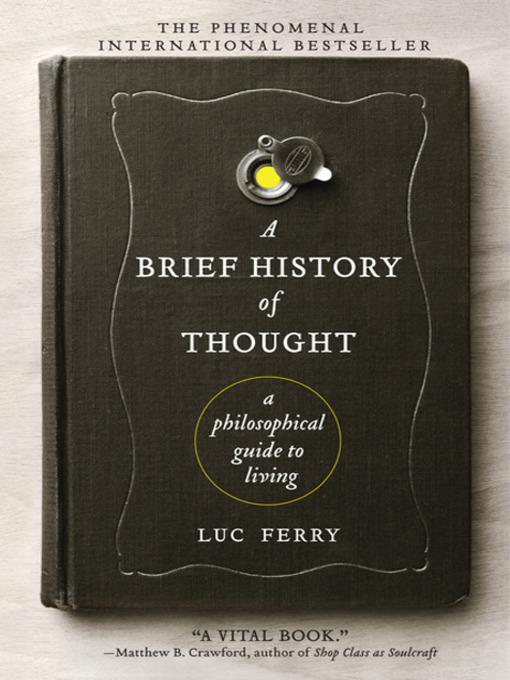
A Brief History of Thought
A Philosophical Guide to Living
کتاب های مرتبط
- اطلاعات
- نقد و بررسی
- دیدگاه کاربران
نقد و بررسی

Starred review from October 10, 2011
This scintillating pop-philosophy survey, a bestseller in France, brushes off the cobwebs and gives the subject compelling immediacy. Sorbonne professor Ferry (What Is a Good Life?) offers a thematic introduction to continental philosophy constructed around the biggest questions: how can we lead a meaningful life knowing that we will die but without the consolation of religion? (Ferry denies Christianity the status of a real philosophy, but considers its intellectual legacy so fundamental that the book is in many ways a search for an atheistic Christianity.) The author’s episodic treatment starts with the Stoic concept of man as a fragment of a harmonious cosmos, moves on to Descartes, Rousseau, and Kant and their establishment of philosophy based on reason and individual freedom, climaxes with Nietzsche’s demolition of modernist certitudes—a stance he finds both thrilling and unsatisfying—and ponders the abiding need to embrace a world we must ultimately lose. Ferry has a knack for translating difficult concepts into laymen’s terms; he even makes Heidegger’s opaque mysticism not just coherent but actually relevant to the global economy. Neophytes and scholars alike will find in this superb primer proof that philosophy belongs at the center of life.

November 1, 2011
The award-winning French philosopher briefly summarizes the major philosophical ideas since Ancient Greece and explains why he has opted for contemporary humanism. Ferry (Philosophy/The Sorbonne; Learning to Live: A User's Manual, 2010, etc.) writes that some dinner guests recently challenged him to create a philosophy course for children and adults, something presumably accessible to both. If this book is the result, Hogwartians may be the only children capable of comprehension. But many college-educated Muggles will doubtless find it useful, too. The author begins with perhaps the most difficult question (What is philosophy?) and offers a three-dimensional answer: salvation (not in the religious sense), theory and morals and ethics (terms he uses interchangeably). The author then moves on to his historical tour of philosophical ideas, focusing on the first superstars--Plato, Aristotle et al. He examines how Christianity was able to supplant the Greeks (the religion's vastly appealing notion of the afterlife) before moving on to humanism, a movement prompted by the discoveries and thought of Copernicus, Newton, Descartes and Galileo. Kant and Rousseau earn high marks here (though not the highest). Next comes Nietzsche. The author acknowledges, more than once, how that philosopher's ideas, unfortunately, appealed to the Nazis, but Ferry mostly succeeds in separating the thoughts from the deeds. The author views Heidegger as the most important post-Nietzschean, focusing sharply on that philosopher's views of technology and materialism and how they threaten the possibility of a more reflective, philosophical population. Ferry tries to lighten the tone of the narrative with literature (Poe makes an appearance, as does V.S. Naipaul) and popular culture (allusions to digital music). Ferry is an atheist and suggests throughout that religion is irrelevant. A focused history, neither simple nor simplistic, that--no surprise--shows the history of philosophy moving inexorably toward the author's current beliefs.
(COPYRIGHT (2011) KIRKUS REVIEWS/NIELSEN BUSINESS MEDIA, INC. ALL RIGHTS RESERVED.)

February 1, 2012
Ferry (philosophy, Univ. of Paris; Man Made God: The Meaning of Life) offers an "introduction" to philosophical reflection and reasoning that he intends to be accessible to children as well as casual adult readers. This volume, a best seller in France, is less likely to be of interest in the United States to anyone untutored in reading academic prose. What Ferry does provide, however, is context and extrapolation on such canonical philosophers as the Pre-Socratics, Augustine, Rousseau, Nietzsche, and Heidegger. By referencing literary works published during the flow of Western philosophy's history and showing how they inform and are informed by contemporary developments in the philosophy of ethics, reality, education, and reason, he enriches his discussion in a manner that does indeed speak well to educated lay readers who have not heretofore tried to access the main tenets of Western thought's development. By offering inspired but credible associations between specific philosophical conceptions and the "good life," he also provides a way for readers to personalize this intellectual voyage. VERDICT For readers set to explore Western philosophy or those who enjoy such introspective writers as Viktor Frankl (Man's Search for Meaning).--Francisca Goldsmith, Infopeople Project, Berkeley, CA
Copyright 2012 Library Journal, LLC Used with permission.

Starred review from December 1, 2011
No dry academic, Ferry restores to philosophy a compelling urgency. That urgency, manifest in the probings of the ancient Stoics and still animating the strivings of postmodern phenomenologists, springs from the need to surmount the fear of death and to find meaning in life. As he traces the evolution of philosophy, from Crates' demonstration of harmony in the cosmos by making love to his wife in public, to Husserl's discovery of transcendence in a six-sided matchbox, Ferry highlights philosophers' commitment to formulating a theory of the world, identifying means of knowing truth within that theoretical world, and finding ways to live wisely. Insistent that those performing this three-fold task cannot be guided by divine grace, Ferry joins Nietzsche in rejecting salvation of the immortal soul in heaven. Yet he glimpses philosophic salvation in this world in the wisdom that post-Nietzschean humanists develop through love. In rejecting faith, albeit with surprising wistfulness, Ferry parts company even with believers, including Augustine, Kant, and Pascal, from whom he has learned much. But in a conclusion that warns against both dogmatism and skepticism, readers will sense Ferry's abiding solidarity with all who seek horizons large enough to encompass human perplexitiesand corresponding human hopes!(Reprinted with permission of Booklist, copyright 2011, American Library Association.)

























دیدگاه کاربران